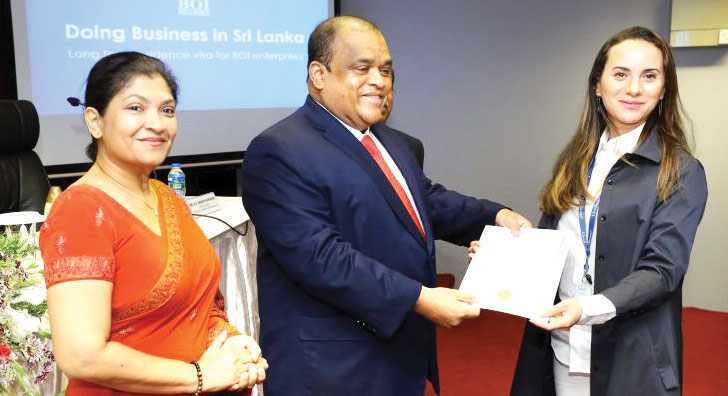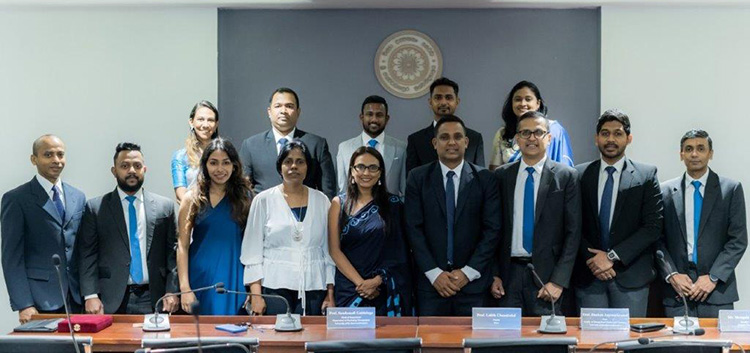Business
BOI launches long term residence visa programme for investors

The Board of Investment (BOI) recently launched the five-year residence visa program dedicated to investors, stakeholders and BOI enterprises.Issuing long-term visas for investors has been the practice as per the international standards. On par with matching the international benchmark in respect of ease of doing business, the BOI has decided to launch this program to attract more investors to the country.
The long-term visa program, a long-felt need, primarily aims to facilitate the investors who wish to embark on a journey with the BOI.The BOI annually issues 7500-8000 visa recommendations for investors, employees and dependents.The BOI has granted visas for foreign nationals from 109 countries such as India, the United Kingdom, Japan, Korea, Malaysia and Pakistan which represent the most applicants based on last year’s statistics.
Addressing the gathering, Investment Promotion Minister Dhammika Perera said “The happiness on the faces of those investors present at the occasion, implies that the newly launched visa residence scheme is a success,”
“Before the implementation of this program, they had to go through a long documentation process every year to get these visas,” he pointed out.
“Having understood the prime need to provide a seamless and convenient service for investors, we have launched the new program albeit I have not officially assumed duties as the Investment Promotion Minister,” Perera highlighted.
BOI Director General Renuka M Weerakone stated “It is certainly a pleasure to see all our long-standing investors on this special day of launching the long-term residence visa program for investors.
“You all have been the contributors towards 65% of export earnings to Sri Lanka and have stood by us even in times of difficult periods that our country faced, which we wish to acknowledge with great gratitude,” she underscored.
Business
Browns Investments sells luxury Maldivian resort for USD 57.5 mn.

A five star 100-room Maldivian resort hotel property controlled by Browns Investments PLC has been disposed for USD 57.5 million, Browns Investment said in a stock exchange filing on Friday. The company had previously disclosed in September that the deal was in the pipeline pending completion of precedent conditions.
The property. Barcelo’ Whale Lagoon Maldives, belonged to Browns Ari Resort (Private) Ltd., a subsidiary of Browns investments, was purchased by ASB Hotel Properties Maldives Private Ltd.
“The transaction was completed following the satisfaction of the conditions precedent set out in the Sale and Purchase Agreement, for a total consideration of USD 57,500,000,” the filing said. The price was considered “significant” but was not the highest in the Maldives where high end hotel properties command top dollar.
Browns Investments (BIL) has a significant presence in the Maldives, developing multiple properties, notably through partnerships with Spain’s Barceló Hotel Group for projects like Barceló Whale Lagoon (now sold), Barceló Nasandhura (city hotel/apartments), and the Bodufaru Beach Resort (a major integrated project with three hotels) in North Male Lagoon, with BIL aiming to be a major Sri Lankan hotel operator in the Maldives with large room capacity.
BIL’s key Maldives projects are:
Bodufaru Beach Resort: A large-scale development in North Male Atoll with three five-star hotels, a significant undertaking with Barceló Hotel Group and Syno Hydro Corporation.
Nasandhura Palace Hotel (Barceló Nasandhura): A luxury city hotel and apartment complex in Male, managed by Barceló.
Strategy & Partners:
Browns Investments partners with Barceló Hotel Group, a Spanish hotel chain, for management and investment in their Maldivian properties.
The company aims to become the largest Sri Lankan hotel investor and operator in the Maldives, significantly expanding its room keys in the region, as described on the Browns Investment website.
Browns Investments is actively developing and managing luxury hotel properties in the Maldives, focusing on large integrated resorts and city hotels, leveraging international partnerships to grow its presence in the high-end tourism market, according to the company.
Business
Marketing Alumni Association of USJ Outlines Strategic Vision to Strengthen the Future of Marketing in Sri Lanka

The Marketing Alumni Association (MAA) of the University of Sri Jayewardenepura (USJ) set out its strategic direction for the year ahead at its Annual General Meeting (AGM) held on 10 December 2025. The event brought together academic representatives from the Department of Marketing Management and a strong contingent of alumni, providing a platform to review the association’s progress and reaffirm its commitment to advancing the marketing profession in Sri Lanka.
As the official body representing graduates of the Department of Marketing Management of the University of Sri Jayewardenepura, the MAA has, over the past 25 years, supported a network of more than 1,500 marketing professionals who now hold influential roles in leading private and public sector organizations. The association remains committed to elevating the standing of the Japura Marketing degree by strengthening industry partnerships, supporting academic excellence, and fostering a high-performing alumni community.
A key focus of the AGM was the appointment of Oshadee Withanawasam as President of the MAA for the upcoming term (2025-2027). In his inaugural address, Mr. Withanawasam emphasized the importance of strategic leadership, industry relevance, and collaborative growth in positioning USJ and its alumni at the forefront of marketing innovation in Sri Lanka.
Over the past year, the MAA has intensified its engagement efforts through a series of high-impact initiatives. The Kings and Queens Dinner Dance 2025, which brought together over 200 members, strengthened camaraderie within the alumni network. On the academic front, the association’s flagship ‘Fine Touch’ guest lecture series, conducted in partnership with the Department of Marketing Management, USJ, continued to offer undergraduates valuable exposure to industry best practices and emerging trends.
A significant milestone for the association was the launch of its first structured mentoring program for undergraduates of the department. This initiative marks a notable advancement in bridging academic training with practical corporate experience, equipping students with the competencies required to excel in a competitive business environment.
The MAA also continued to deliver meaningful social impact through its ‘Bring a Smile’ initiative, which has supported rural schoolchildren for three consecutive years (2023–2025) by providing essential stationery supplies. Further strengthening its commitment to education, the association introduced a scholarship scheme in 2024 to support deserving undergraduates pursuing their higher education in marketing.
During the AGM, outgoing President Dr. Darshana Jayasinghe and the Head of the Department of Marketing Management of USJ, Prof. Sandamali Galdolage, commended the association’s continued progress and reiterated their support for its long-term vision.
The following office bearers were appointed for the new term: Oshadee Withanawasam (President), Amitha Amarasinghe (Deputy President), Nipuni Karunarathna (Vice President), Vimukthi Kaushalya (Secretary), Thisaru Menake (Assistant Secretary), Nuwan Indika (Treasurer), and Thilanka Kalpage (Assistant Treasurer). Committee Members for the term include Prof. Ashoka Malkanthie, Chandra Kodithuwakku, Manuri Jayasinghe, Champika Vincent, Naleendra Yasassri Perera, Kaushan Agalawatte, Chandranath Gamage, and Pamudi Ketawalage.
Dr. Darshana Jayasinghe and Lalith Sumanasiri will serve as Advisors, while Prof. Sandamali Galdolage, Manojee Dabare, and Prof. Lalith Chandralal will continue as Trustees of the MAA.
Business
18 certified sales training consultants graduate at BMICH

A graduation ceremony for 18 Certified Sales Training Consultants, qualified to mentor aspiring marketing professionals and enhance standards in the country’s sales sector, was held recently at the Bandaranaike International Conference Hall.
The graduates represent the first phase of a programme aimed at producing 50 Certified Sales Training Consultants nationwide. The training and certification were conducted by the Asian College of Sales and Marketing (ACSM).
According to ACSM Director and Learning Consultant Sugath Munasinghe, the need for professionally certified sales training consultants to raise the quality and effectiveness of the sales sector has been identified for some time. He added that ACSM, as a higher education institute, will continue to provide structured training and certification to meet this demand.
-

 Midweek Review5 days ago
Midweek Review5 days agoHow massive Akuregoda defence complex was built with proceeds from sale of Galle Face land to Shangri-La
-

 News4 days ago
News4 days agoPope fires broadside: ‘The Holy See won’t be a silent bystander to the grave disparities, injustices, and fundamental human rights violations’
-

 News4 days ago
News4 days agoPakistan hands over 200 tonnes of humanitarian aid to Lanka
-

 News5 days ago
News5 days agoBurnt elephant dies after delayed rescue; activists demand arrests
-

 Business3 days ago
Business3 days agoUnlocking Sri Lanka’s hidden wealth: A $2 billion mineral opportunity awaits
-

 Editorial5 days ago
Editorial5 days agoColombo Port facing strategic neglect
-

 News3 days ago
News3 days agoArmy engineers set up new Nayaru emergency bridge
-

 News5 days ago
News5 days agoSri Lanka, Romania discuss illegal recruitment, etc.













